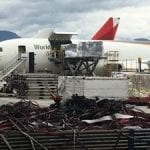
Unrest in the capital of Ecuador has led to road blockades that are making it difficult and dangerous for farms to transport flowers to the airport for export.
The U.S. floral industry is experiencing disruptions in fresh product from Ecuador because protesters in and near the country’s capital of Quito are blocking roads and reportedly vandalizing and stealing flower trucks, making it difficult and dangerous for farms to transport flowers to the airport.
Indigenous people began protesting President Guillermo Lasso’s social and economic policies on June 13. Lasso declared a state of exception, similar to a state of emergency, in six provinces, to little effect. Protesters marched through Quito this week and continued to block roads connecting the capital to the north and south.
International Business Times recently reported that Ecuador’s productive sector had already lost $50 million because of the difficulty exporting products. Alejandro Martínez, president of Expoflores, the National Association of Flower Producers and Exporters of Ecuador, said on Twitter on June 19 that financial losses in the country’s flower industry are between $10 and $12 million and growing. His organization estimates the sector is losing about $2 million a day.

Images coming out of Ecuador show protestors blocking flower delivery trucks and setting vehicles and tires on fire. Photo courtesy of Kennicott Brothers.
In a June 17 letter to international business partners, Expoflores said the airport is operational, and they have the support of cargo companies — including extended hours and coordination of advance deliveries — to ensure flowers are shipped.
Despite those efforts, Expoflores said on Twitter on June 18 that a large percentage of flowers were not making it to the airport. “So far 75% of flower producers throughout Ecuador have NOT been able to dispatch the cargo. The roads remain blocked despite a state of emergency…”
Videos and photos of the roads around Quito show roads blocked by people, mounds of dirt, old tires and more. Videos and photos retweeted by Expoflores show protestors surrounding trucks of flowers and trucks with punctured tires.
Tim Dewey of DV Flora has seen some shipments from Ecuador delayed over the past 10 days due to the continued protests, and his company’s team in South America is working closely with each farm impacted to move shipments when a farm cannot make their way safely to deliver their flowers to the cargo agency. “We have seen some harrowing videos of attempts to stop trucks trying to deliver and in some cases, roads are blocked especially in the Cayambe region over the past couple of days, making it very difficult for farms to send shipments,” he says.
Lenny Walker of Kennicott brothers says yesterday he learned that the level of violence has increased to the point that most major farms Kennicott works with will pause delivery operations to protect their employees.
Liza Roeser, the CEO of FiftyFlowers who launched her career in Ecuador during a Peace Corps assignment, says the farm her company works with has been unable to reach the airport, which is about a 25-minute drive from the farm. On Monday night, the farm’s workers spent four hours trying to drive to the airport before turning around, she says.
“It’s a war zone,” Roeser says. She worries about the farmers, who are just regaining financial stability after the pandemic.
Agustin Calisto, owner of Magnificast SAS, which grows novelty chrysanthemums near Quito, says the conditions are difficult, and warns that American importers, wholesalers and florists will see disruptions in flower supply.
“Know there is an issue — some level of scarcity,” Calisto says.
He also advises those relying on Ecuadorian flowers not to panic.
“We’ve seen this for the last 20 years,” Calisto says. “Every couple of years there is a strike, problems. I don’t estimate there is going to be a stop to shipping flowers. Flowers are still flying. There might be some things that are hard to find.”
Roeser suggests having a backup plan for shortages.
“Be ready to pivot quickly,” she says. “Nothing is guaranteed at this point. Have a Plan B and don’t be afraid to go to Plan B.”
Amanda Jedlinsky is the managing editor of SAF NOW.



